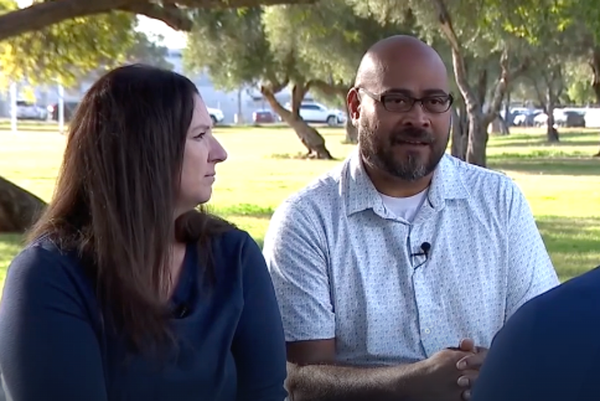Kevyn Morris was diagnosed with cognitive impairment five years ago when he was aged 55.
"Too many concussions over the years," he says.
He struggles with his short-term memory and emotions.
The Jagera man, who lives in Wodonga in north-east Victoria, says most people's idea of dementia is of a person incapable of doing anything.
"You get a diagnosis, it doesn't mean your life is over. It doesn't make things better, but there are things that we can still do," Mr Morris says.
At the recent annual National Dementia Conference in Melbourne, Mr Morris was a guest speaker. The one thing he wanted attendees to understand was that a dementia diagnosis does not mean a person is unable to function anymore — they just function differently.
Gwenda Darling agrees. Like Mr Morris, she was diagnosed with a form of dementia in her 50s.
Both want to destigmatise dementia and raise community awareness about the 100-plus different forms of dementia out there.
Both Ms Darling and Mr Morris say an early diagnosis helps. It can improve the quality of life for people living with dementia as it helps establish treatment, medication, and support pathways.
It's why Ms Darling and Mr Morris share their stories when they can.
Mr Morris, a former furniture maker who cannot work anymore, says life changed when he was diagnosed.
"It won't make your life better, but it will change it," he says.
"I used to paint and draw pretty well. I can't remember how to paint much anymore.
"I had every licence known to man and now I am down to a car licence [for now] due to the diagnosis."
He says people diagnosed with dementia still have much to offer, and it is important people with a diagnosis find something they are passionate about.
Mr Morris, who is an advocate for various organisations including Dementia Australia and the Older Persons Advocacy Network, cooks and is a keen photographer.
He says his advocacy work, which may help other people get diagnosed early, makes him feel "worthwhile".
Mr Morris says people with dementia are not looking for sympathy but understanding and support so they can do what they want to do.
His wife, Leanne Morris, who works part-time in aged care, says they are more than a married couple — they are a team.
"He forgets words. That's where I come in, I don't speak for him, but I prompt him," Ms Morris says.
They have labelled cupboards around their home and have a shut-off device installed on the stove to turn off the gas if needed.
A few kilometres across the border into NSW, Ms Darling, a Palawa woman, divides her time living in her unit at Thurgoona and at her home, further north-west in Finely.
"I still have my home in Finley, but I have a unit in an over 55s village because going into aged care is not an option for me," she says.
"I have got the unit and I am setting up services and everything I need so I can age well at home," she says.
The former social worker was diagnosed with behavioural variant Frontotemporal dementia (bvFTD) 10 years ago at the age of 59.
She says life as she knew it ended when she was diagnosed with bvFTD. She lost her job and her driver's licence.
"Friends you might have had for years leave you."
'People with dementia still functioning human beings'
Ms Darling, who is on the Australia Dementia Network Steering Committee and runs multiple dementia-inclusive communities in Finley and Tocumwal, actively works to destigmatise dementia.
She also plans to start up a community support group in Albury.
"Dementia is not contagious; a lot of people don't know how to relate to people living with dementia and they don't understand the different dementias," she says.
"I still function but I don't function in the same way, and we need families and communities to know that and support us.
"I can still work out how much something costs in a shop … I can't cook the same way anymore; I need to follow a recipe step-by-step."
Ms Darling says there needs to be more of an acceptance that some people in the community with dementia may display behaviours different to societal norms.
"It would be great if shops had specific hours like some do for people with autism, that people living with dementia could go to, shops with lower lights and no overstimulating background noise with staff that understand and are compassionate to behaviour changes."







